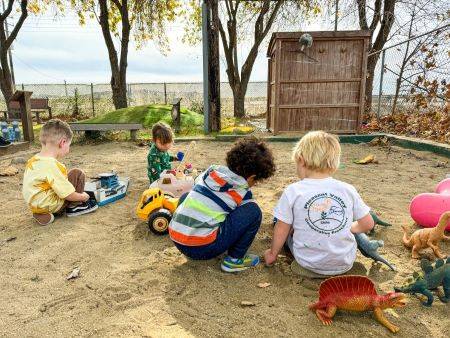Our Philosophy
Vision
To partner with parents in creating lifelong lovers of learning.
Philosophy Statement
We believe children need the time and freedom to explore and learn in a loving, safe, and stimulating environment.
As qualified teachers we intend to provide an environment that will foster the optimum development of the whole child: socially, emotionally, cognitively, and physically.
A key element to all children's success is their ability to question, explore and make decisions on their own, and to voice their thoughts with confidence.
We aim to provide children with many opportunities to use friendship-building phrases like "Hi, may I play?" and "Yes, you can use it when I'm finished".
At the Co-op, we focus on:
We truly believe that an enriched and positive environment will foster a lifelong love for school and learning. An environment where adults use phrases like "What do you think?" and "Yes, I like your thinking".
We believe that for children to get the best possible education, parents must be informed, involved and active participants in their child's schooling experience.
We believing in continuing learning for adults as well as children. We are long time members of NAEYC, CAAEYC, CCPPNS and often attend, participate and present at conferences as time allows and then bring that knowledge back to the Co-op to share.
We believe that when parents and teachers partner together, school is meaningful. Any input, suggestions, or information that enhances a child's experience is welcome.
Discipline Statement
Our positive approach to discipline is teaching children to express their feelings through words and appropriately expressive play equipment (such as balls, beanbags and play dough). Children become familiar with expressions like "I'm not for hitting", "I'm your friend" and "I want to play with you." Communication between children becomes an important social skill as well as a discipline statement. We use redirecting and communication instead of time out. Words such as "No" and "Stop" are reserved for emergency or safety situations.
Testing limits is a natural part of being a child and creating logical limits is part of being a teacher and a working parent. We will set clear limits, stating simple related consequences and redirecting children to alternatives. In the event that a child goes as far as to hurt another child, he/she will be encouraged to assist in caring for his/her friend (by providing ice packs, bandages and comfort). This allows him/her to see the consequences of his/her actions, and help relieve guilty feelings and show concern.
Should a conflict arise between two children (and they will) we will approach calmly, stopping any hurtful actions or words, gather information, acknowledging their feelings and restating the problem. We will then provide the forum for the children to communicate to each other, allowing them to come up with some solutions and together they will choose one that best fits their needs. Our role as teachers is to facilitate, not to judge or decide for them, and we will give follow up support as needed.
Open communication is an essential part of Pleasant Valley Cooperative Preschool. Should a problem arise, the teacher will confer with parents to develop a collaborative solution. A plan of action will be developed based on the child's need and our knowledge of Child Development.
How children learn:
Children learn through play.
Through play they explore their environment, learn to deal with problems, and learn to work within a group. Play means a self motivated, emotional connection.
Children learn through doing.
We provide a classroom open to exploring a variety of activities and situation where children can make decisions and choices on their own.
Children learn at their own pace.
Children are different and we should embrace and celebrate their unique skills and talents.
Children learn through observing others.
We are their role models. It is important that we listen to their thoughts and feelings and help guide them along the way.

